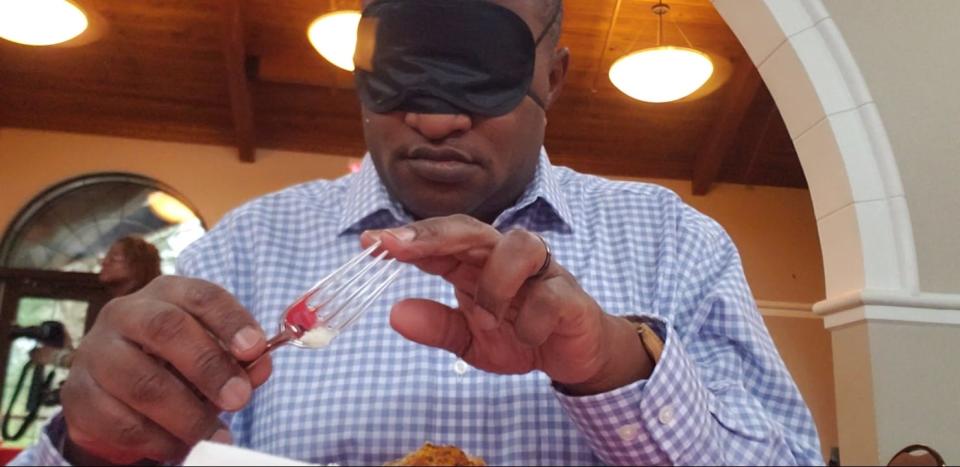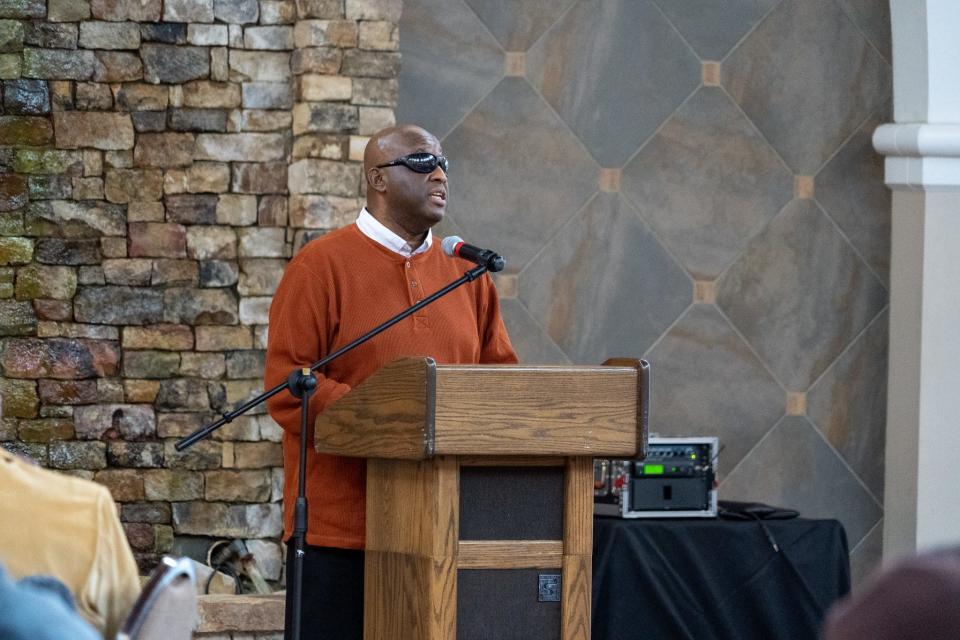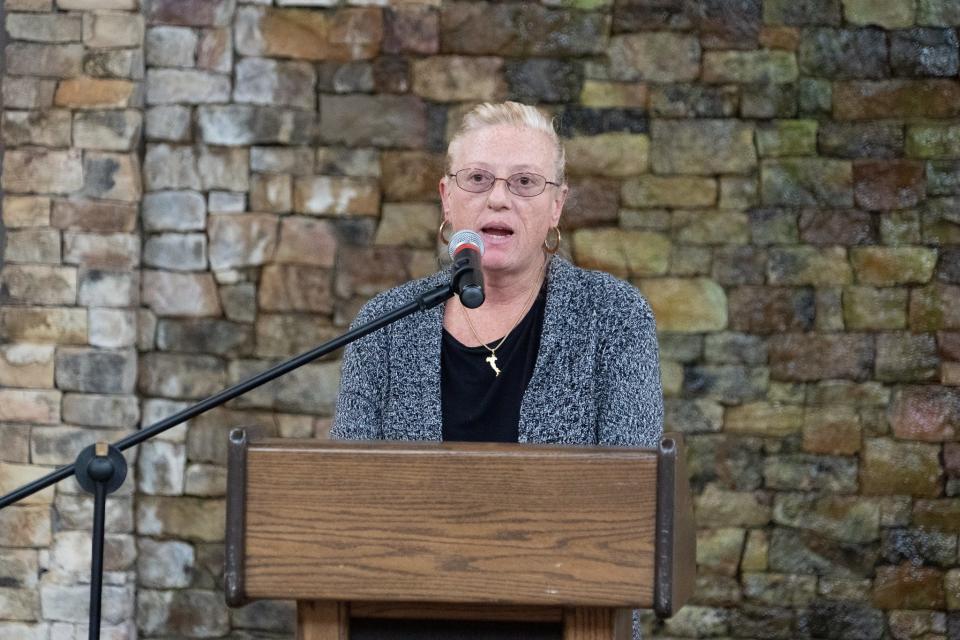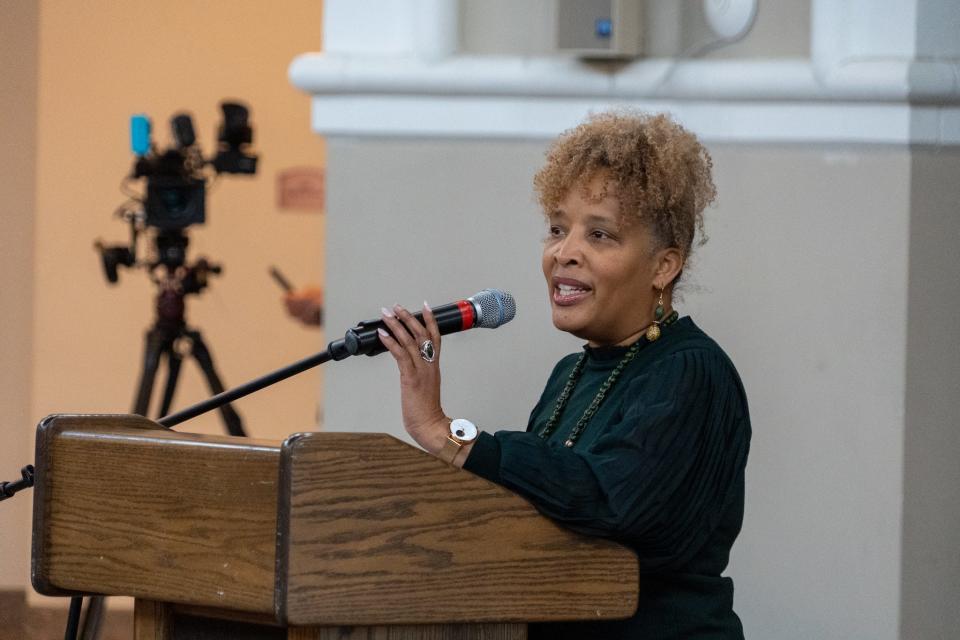Dining blind in Fayetteville: A lesson during lunchtime

On Wednesday, I attended a “Dining & Dialogue” luncheon, where we heard about the Cape Fear Regional Vision Resource Center, which assists the blind and visually impaired.
It was a working lunch, sponsored by Fayetteville-Cumberland Human Relations and held at the Cape Fear Botanical Garden. We were invited to try to eat with one of the blindfolds arranged in a stack in the center of the table, or a set of special glasses that reduced vision. The goal was to see how long we could last.
More:Partnership leads to employment for blind residents
I like a good challenge, so I tried on the blindfold to eat my meal of chicken, mashed potatoes, salad and broccoli.
In truth, the exercise was more frustrating than fun. I lasted just under 7 minutes.
I had to poke the tips of my fork to make sure I was using it and not the spoon. One time, I lay it down and felt lost for a few moments until I located it. I touched the food to get the texture.
More:From sight to blindness, she still stays busy
Some people were not blindfolded or had finished with their exercise, and I wonder how I must have looked fumbling around.
There were other frustrations.

The scheduled speakers began while we were eating. As the first person, Giovanna Gordon, shared her story, I wanted to see her face — simply to match it with her voice. It is something the sighted take for granted.
More:Blindness does not stop this beekeeper, baker, and kayaker
I tried in vain to locate my beverage. I touched gingerly all around my plate, worrying I would knock it over and make a mess. Only at the end of the meal did I realize I had not gotten a beverage when I was in line.
I ate very little of my meal until I took the blindfold off, to much relief. But the message came through loud and clear: People who are blind or visually impaired cannot just simply take the blindfold off.
‘We just want a chance’
But you are not helpless, we were told. You just have to learn new ways of doing things.
That was the message from Keith Godwin, one of the lunch speakers, who lost his vision suddenly after an accident in February 2020.
More:Center sees a way to help
“I am what I call ‘newly blind,” he said. “By April of the same year, I was totally blind. I lay down one night and woke up the next morning, I couldn’t see."
He could still sense things and wondered if this is what it was like to be dead. Then he realized he had lost his vision.
Godwin was a hard worker — a workaholic he says — before he lost his sight, and restless. He cannot stand just sitting at home, he said.

“The transition has been very difficult for me,” he said. “I just felt like there was nothing I can do. I was in a fog. I felt like everything I had accomplished in life had just disappeared.”
The Cape Fear Regional Vision Resource Center has helped greatly, he said. He connected with people who were in a similar situation.
That made him realize: “I could do some of the things I normally did. I would just have to think a little bit different or find another way to do it.”
He said a remaining challenge is finding housing that is affordable and can accommodate his condition, which has reduced his job prospects and income.
“I’m still looking, as a matter of fact,” he said, and asked people in the audience to tell him if they knew of anything.
Godwin said city and county government could help visually impaired people — and society at large — by offering more job training and development.
“Sometimes it’s just a matter of turning things around just a little bit to accommodate us,” he said. “You’ll see that you have a valuable commodity in us.
“We just want a chance. Not asking for anyone to give us anything. As a matter of fact, we bring things to the table.”
‘I want to do things’
Giovanna Gordon said she would like to see more sidewalks. She cited the accessibility in cities like Raleigh and Charlotte and said she hopes for the same in Fayetteville.
She has only tunnel vision due to a condition called optic neuritis.

“The thing that concerns me the most is I want to be a part of the community,” she said. “I want to get out and I want to do things, but it’s hard for somebody who is either blind or like me, visually impaired.”
Gordon said the Vision Resource Center helped her come out of her shell. Some of that help has come in the form of teaching her how to navigate her home and connecting her with a mobility specialist who helped her learn to get around in an outside environment.
“Instead of sitting home, crying and feeling sorry for myself,” she said. “I have done more like getting out — rock climbing indoors, going places, going to plays, going to the zoo.”
But difficulties remain. In November, Gordon had to go to an urgent care facility and tried to walk up stairs that had no railing.
“Well, I fell UP the stairs,” she said. The front of the building had clear glass and people saw what happened, but nobody moved to help her off the ground, she said.
Inside, the receptionist asked, “Are you OK?” said Gordon.
“That’s when I said ‘Thank you very much,’ turned around and took my business somewhere else.”

Inclusiveness
After Gordon spoke, Terri Thomas, executive director of the Vision Resource Center, reiterated the importance of sidewalks and businesses installing railings.
And also: “Sensitivity in the workplace.”
Yamile Nazar, director of Diversity, Equity & Inclusion for the Human Relations Commission, opened up the event for questions.
She said in answer to a question about when to help someone who is visually impaired: “Ask,” referring to a handout that was circulated on “Tips for Interacting with a Visually Impaired Person.”

Two women gave separate accounts of how they were ignored at retail outlets, or treated dismissively.
Thomas, in her earlier remarks, listed that as an area where sighted people can help.
“Think about going to a store, you see a person that’s blind and the customer service agent does not look to them because they feel like they don’t exist,’ she said. “Maybe you say, ‘Hey, she was first.’”
Thomas said she hoped people would leave the Dining & Dialogue with a desire to advocate for the blind and visually impaired. She said examples could include petitioning the city and county government for chirping bird signals at intersections or rethinking how Zoom meetings are conducted, where participants could help by verbalizing all the business of the meeting.
“Inclusiveness is what I want us to have as a result of this exercise,” she said about the meal.
It was certainly a learning experience for me.
Myron B. Pitts can be reached at mpitts@fayobserver.com or 910-486-3559.
This article originally appeared on The Fayetteville Observer: Pitts: Dining blind in Fayetteville is a lesson during lunchtime

